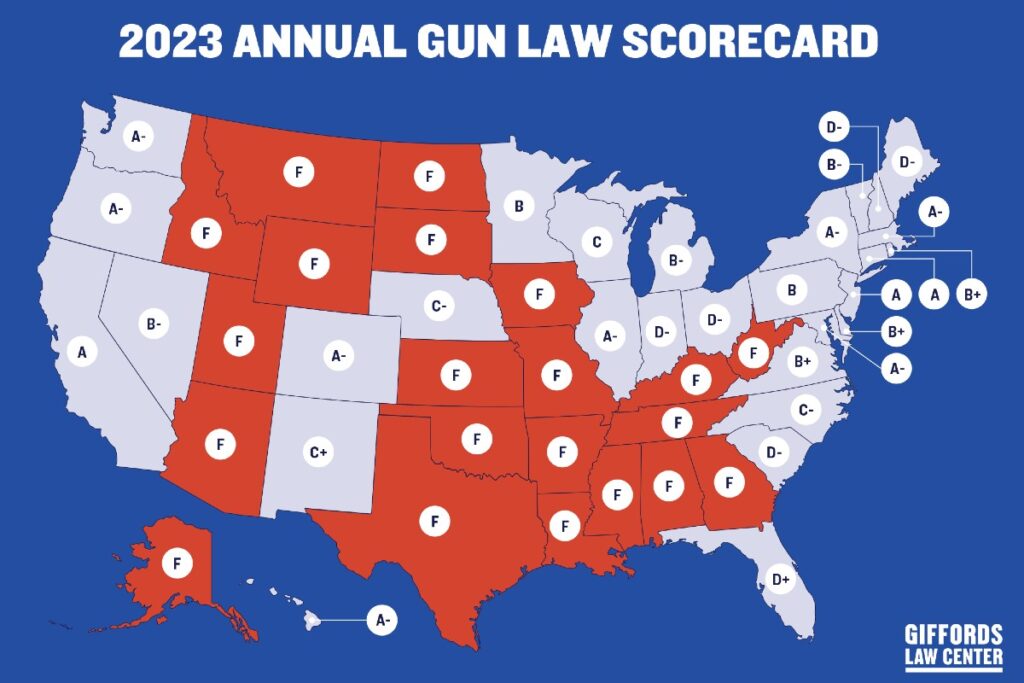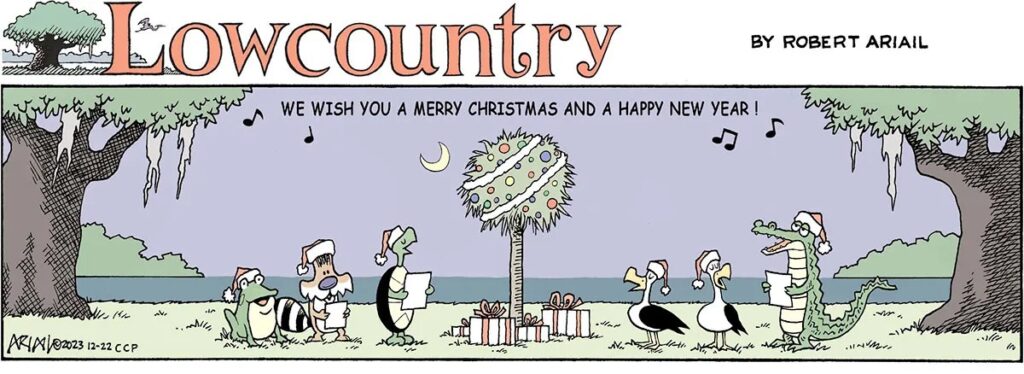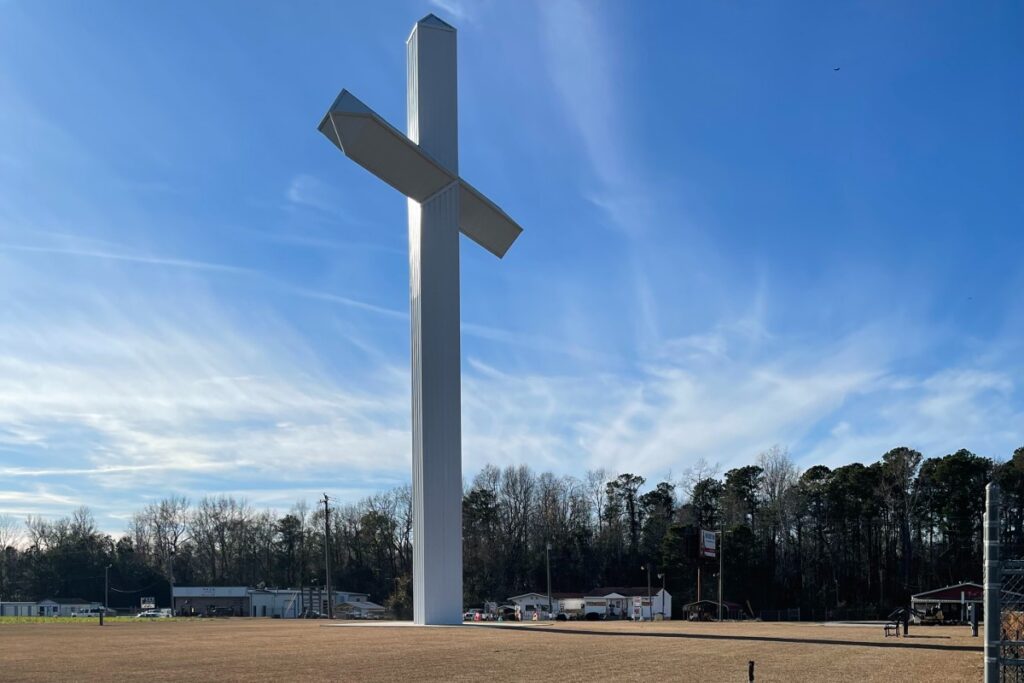STATEHOUSE REPORT | ISSUE 22.51 | Dec. 22, 2023
BIG STORY: S.C. gets D- on annual gun law report card
LOWCOUNTRY, Ariail: Happy holidays
COMMENTARY, Brack: Democratic presidential primary has layers of importance
SPOTLIGHT: SC Clips
MY TURN, Todd: Legislature should fix how juries compensate the injured
MYSTERY PHOTO: Big cross
FEEDBACK: Thank you for the good news
S.C. gets D- on annual gun law report card

By Skyler Baldwin | South Carolina received a D- on an annual report card that offers a comprehensive, 50-state analysis on gun laws and gun violence rates.
South Carolina received such a low grade for failing to pass significant legislation to curb gun violence, according to the report by the Giffords Law Center (GLC) to Prevent Gun Violence. Other Southern states, except Florida, Virginia and neighboring North Carolina, received grades of F.
“We know gun laws save lives — but South Carolina has failed to take significant steps to protect its constituents,” said Peter Ambler, executive director of GLC. “More can and must be done. It’s time for lawmakers to get on the same page as most Americans and pass policies to make their states safer.”
This year as of Dec. 22, some 1,114 people were shot in 997 shooting incidents in South Carolina, according to gunviolencearchive.org. Out of those shot, 395 died. The numbers show little significant differences from the year before — 1,143 people were shot in South Carolina in 2022 across 1,004 incidents. Of those, 431 died.
The numbers give the Palmetto state an average of 21.3 gun deaths per 100,000 people this year, 48% higher than the national average. The data, combined with the lack of significant gun laws passed this year, gives the state the low grade.
In fact, state legislators worked this year to pass legislation that would allow gun owners to carry their firearms in public without a permit. The bill, H. 3594, passed in the S.C. House of Representatives, but a different version passed in the state Senate. The two versions are expected to be reconciled in 2024.
Legal experts with the GLC track and analyze gun legislation across 50 states, allotting point values based on the strengths and weaknesses of existing laws and policies. The points are then compared to national gun death data.
”Every year, our scorecard is a reminder to states that progress is possible, but it’s also a warning of the work we have left to accomplish,” Ambler said. “The Gun Law Scorecard should be both a resource and roadmap for elected leaders, activists, and concerned citizens to take action.”
- Click here to see a map of the scorecard.
- Skyler Baldwin is a reporter with the Charleston City Paper. Have a comment? Send to: feedback@statehousereport.com
Happy holidays

Award-winning cartoonist Robert Ariail generally has a biting or funny comment about the great state of South Carolina in his weekly cartoon. This week, he wishes you a Merry Christmas (sing along) and a Happy New Year!
- Love the cartoon? Hate it? What do you think: feedback@statehousereport.com.
2024 Democratic primary has layers of importance

By Andy Brack | While most South Carolinians are filling the holiday season with thoughts of sugar plums and Santa Claus, there are more people than you think who have presidential politics on their minds.
 South Carolina will host the Democratic Party’s first-in-the-nation presidential primary on Feb. 3, while the state Republican Party’s first-in-the-South primary will be Feb. 24. If you want to vote in the Democratic contest, you need to be registered by Jan. 4. To vote in the Republican primary that pits former President Donald Trump against favorite daughter and former S.C. Gov. Nikki Haley, you have to be registered by Jan. 25.
South Carolina will host the Democratic Party’s first-in-the-nation presidential primary on Feb. 3, while the state Republican Party’s first-in-the-South primary will be Feb. 24. If you want to vote in the Democratic contest, you need to be registered by Jan. 4. To vote in the Republican primary that pits former President Donald Trump against favorite daughter and former S.C. Gov. Nikki Haley, you have to be registered by Jan. 25.
And that’s just where the drama starts that is causing politicos to fret. In South Carolina, you may remember, people don’t register to vote by party, which means they can vote in either of the two primaries – but only one.
So traditional Democratic voters have some calculating to do. The ballot will include three candidates – President Joe Biden, U.S. Rep. Dean Phillips, D-Minnesota, and nationally-acclaimed author Marianne Williamson.
Biden is expected to walk away with the primary, but what is causing knots in the stomachs of Democratic leaders and consultants is this question: “By how much will he win?” Why are they asking that? Because he’s got terrible overall poll numbers a year out from the election, despite keeping the economy moving forward at a great pace. (Example: The stock market recently reached a new high.)
Also, South Carolina voters in 2020 rescued the Biden campaign and propelled him with a strong win toward the nomination. Biden got just under 50% of the 539,263 votes cast in a field of seven candidates. Total turnout was 16.4 percent out of 3.3 million voters.
South Carolina was important for the Biden campaign because his performance in 2020 showed his appeal to a diverse electorate, compared with mostly white voters earlier in New Hampshire and Iowa. A large percentage of his supporters in South Carolina were African American.
And that’s what has political types fretting. Biden isn’t doing as well overall in national polls, including with Black voters. And, if they don’t show up like they did in 2020 – even if Biden wins – the punditry will have a field day.

“Biden’s overall approval is low but there is not a strong challenger on the Democratic side,” College of Charleston political scientist Gibbs Knotts noted. “In addition, South Carolina is a very good state for Biden when it comes to the Democratic primary electorate.
So the S.C. Democratic Party (SCDP), officially neutral, is pulling out all the stops to get folks to their polls. It has nearly 50 new staff members and is planning voter outreach in all 46 counties as well as a statewide bus tour.
“We’re going to fight to keep our first in the nation status by making sure our voters know how to seize this opportunity,” SCDP Chair Christale Spain said Dec. 12. “This is the beginning of a new era for the South Carolina Democratic Party – one where we use our resources to meet voters early and often, not just around election time.”
The other thing that bothers some analysts is that a healthy number of Democratic voters might decide not to vote Feb. 3 because they opt to vote Feb. 24 in the GOP contest. Why? To send a message that Trump, who is the frontrunner by a large margin according to a recent Winthrop Poll, should not go back to the White House. They’ll likely back Haley, who is widely seen as the Republican with the best chance to beat Trump.
While the 2020 primary here was a must-win for Biden, the 2024 GOP primary may be a must-win for Haley.
Knotts observed, “The real contest is in the GOP primary, and I could see moderates and independents voting for one of Trump’s GOP challengers.”
More on that soon.
Andy Brack is editor and publisher of Statehouse Report and the Charleston City Paper. Have a comment? Send to: feedback@statehousereport.com.
SC Clips
 Statehouse Report is brought to you weekly at no cost thanks to our underwriters. In the spotlight today is SC Clips, an affordable, daily information digest that provides you with the South Carolina news you need every business day. Subscribers receive a daily email news round-up before 10 a.m. that provides a link to each day’s edition of SC Clips.
Statehouse Report is brought to you weekly at no cost thanks to our underwriters. In the spotlight today is SC Clips, an affordable, daily information digest that provides you with the South Carolina news you need every business day. Subscribers receive a daily email news round-up before 10 a.m. that provides a link to each day’s edition of SC Clips.
Each issue (click for sample) provides a concise summary of dozens of the latest newspaper and television reports of news with statewide impact, politics, business and local stories. Readers also are linked to key opinions by South Carolina’s editorial writers.
- Learn more about this great news service that will save you time — which saves you money.
- Get a trial run at no cost.
Legislature should fix how juries compensate injured

By Rick Todd | South Carolina juries may assign financial responsibility to compensate the injured only to those listed on the jury form. But what if all at-fault parties aren’t on it? The answer is: The legislature has said it doesn’t matter. The jury must account for 100% of fault, but only to those listed on the form, no matter their degree of fault. We disagree, and it’s costing all of you.

We call on the legislature to close these doors of injustice, then re-open them to transparency, accountability and responsibility so the jury can properly perform its constitutionally mandated duty.
Here’s how the injury lawsuit game is played. The first move in lawyers’ vehicle accident playbook is to find out how much insurance might be on the table and who’s got it. They calculate percentages of fault amongst all the parties. Then they strategically choose who to ignore, who to sue and who to settle-out, releasing them and shifting their fault to others.
The end game is to single-out and shift fault to the “deepest pocket.” Once that judgment-stacking accumulates to 50% or more, that party can be held liable for rest.
This process is abusive and a burden, forcing too many out-of-pocket and insurance payouts by vulnerable defendants. To worsen the threat and add leverage, increasingly, commercial vehicle operators face skyrocketing demands over the fear that a crafty fee-driven trial lawyer can inflame a jury into awarding a nuclear verdict.
Business trucking is mandated to carry high levels of insurance. Most carry more because servicing industrial and consumer demand via public highways is arguably the riskiest, but most essential of all economic endeavors.
Insurance exists to provide compensation when mistakes or failures occur. But it’s unsustainable to expect the “supply chain” to shoulder the fault or misfortunes of others — worse, to provide jackpots for victims and windfalls for lawyers.
Insurance coverage, pricing and risk management have become too unpredictable. The market is roiling with companies leaving or limiting coverage and pricing — in this uncertainty across all lines, consumer and commercial. With every movement, each link in a product or service’s supply chain adds this insidious additional compounding cost.
This predicament was ruled into law by a progressive-minded 1991 state Supreme Court and lingers due to flawed 2005 “compromise” legislation. In 2017, a different set of justices split over the bill’s intent and technicalities, but seemed to imply the status quo isn’t necessarily good, fair public policy. This time they deferred to the legislature to clarify and close the defective process.
Senate Bill 533, the “S.C. Justice Act,” would answer that challenge by bringing accountability to the public record so juries can dispatch justice without prejudice via a complete jury form listing all at-fault parties. Its sponsors include the Senate’s president, its majority leader, every committee chairman but one, and a brave no-nonsense, non-lawyer Democrat. A majority sponsors. However, entrenched interests threaten to filibuster. They would stifle the state’s legislative agenda to block this critical reform.
Our modern, complex, interconnected economy needs attorneys. But the current system is wickedly unfair and perversely incentivizes the monetization of mistakes.
Inaction has provoked a crisis for some and a slow but intensifying burn for others simply due to the nature of their operations. Certainly, a vicious confrontational cycle for all. No conservative can call this responsible. No liberal can call this justice.
Our Senate must resolve to cure this specific injustice immediately upon convening in January by adopting fair-share doctrines like our sister states. This will help preserve South Carolinians’ names on the doors of businesses and vehicles, and level not only our courtrooms, but the competitive playing field. Then, they owe a study of the whole “system.”
We have a new slogan: “Nothing Without Trucking.” And there is nothing our legislature can do in 2024 that will have a more positive impact on public trust and social inflation than to “Fix the Jury Form.”
Rick Todd is president and CEO of the S.C. Trucking Association, which is based in Columbia.
Big cross

So here’s a big, looming South Carolina cross somewhere that a longtime reader sent this week. Where is it and why was it built so big? Send us your guess of what this photo shows – as well as your name and hometown – to feedback@statehousereport.com.
 Last week’s mystery photo, “Old photo, car” shows what the old Clemson House dorm at Clemson University looked like in 1960. It was built in 1950.
Last week’s mystery photo, “Old photo, car” shows what the old Clemson House dorm at Clemson University looked like in 1960. It was built in 1950.
Allan Peel of San Antonio, Texas, shared some of its history: “This imposing seven-story building, with an iconic ‘Clemson House’ orange neon sign was often one of the first landmarks visitors saw as they approached the university. Note that the neon is not visible in the mystery photo since the sign was on the opposite side of the building from where the photo was taken.
“Originally built as a hotel to replace a boarding house, it was later converted to a residence hall and eventually became the center, not only of the Clemson University campus, but of the surrounding community as well. The building had fallen out of compliance with various building codes and was deemed too expensive to retrofit. Workers began disassembling the interior in 2016 and the neon sign was taken down in July 2017. The structure was demolished by a controlled implosion on December 3, 2017.”
Others who correctly identified the building were: Elizabeth Jones and Jay Altman, both of Columbia; George Graf of Palmyra, Va.; David Lupo of Mount Pleasant; Frank Bouknight of Summerville; Pat Keadle of Wagener; Greg Nowell of Seneca; Sharon Fennell of Clemson; Cris Temples of Charleston; Don Clark of Hartsville; and Warren Player.
- Send us a mystery picture. If you have a photo that you believe will stump readers, send it along (but make sure to tell us what it is because it may stump us too!) Send to: feedback@statehousereport.com and mark it as a photo submission. Thanks.
Thank you for the good news
![]() To the editor:
To the editor:
Thank you so much for this column (12/15: More good news out there than you might think)!
– Dr. Oscar Lovelace, Prosperity, S.C.
Send us your thoughts
We encourage you to send in your thoughts about policy and politics impacting South Carolina. We’ve gotten some letters in the last few weeks – some positive, others nasty. We print non-defamatory comments, but unless you provide your contact information – name and hometown, plus a phone number used only by us for verification – we can’t publish your thoughts.
Have a comment? Send your letters or comments to: feedback@statehousereport.com. Make sure to provide your contact details (name, hometown and phone number for verification. Letters are limited to 150 words.
- ORDER NOW: Copies are in Lowcountry-area bookstores now, but if you can’t swing by, you can order a copy online today.
- Now available as an e-book!
ABOUT STATEHOUSE REPORT
Statehouse Report, founded in 2001 as a weekly legislative forecast that informs readers about what is going to happen in South Carolina politics and policy, is provided to you at no charge every Friday.
- Editor and publisher: Andy Brack, 843.670.3996
Donate today
We’re proud to offer Statehouse Report for free. For more than a dozen years, we’ve been the go-to place for insightful independent policy and political news and views in the Palmetto State. And we love it as much as you do.
But now, we can use your help. If you’ve been thinking of contributing to Statehouse Report over the years, now would be a great time to contribute as we deal with the crisis. In advance, thank you.
Buy the book
Now you can get a copy of editor and publisher Andy Brack’s We Can Do Better, South Carolina! ($14.99) as a paperback or as a Kindle book ($7.99). . The book of essays offers incisive commentaries by editor and publisher Andy Brack on the American South, the common good, vexing problems for the Palmetto State and interesting South Carolina leaders.
More
- Mailing address: Send inquiries by mail to: P.O. Box 21942, Charleston, SC 29413
- Subscriptions are free: Click to subscribe.
- We hope you’ll keep receiving the great news and information from Statehouse Report, but if you need to unsubscribe, go to the bottom of the weekly email issue and follow the instructions.
- Read our sister publication: Charleston City Paper (every Friday in print; Every day online)
- © 2023, Statehouse Report, a publication of City Paper Publishing, LLC. All rights reserved.















 We Can Do Better, South Carolina!
We Can Do Better, South Carolina!